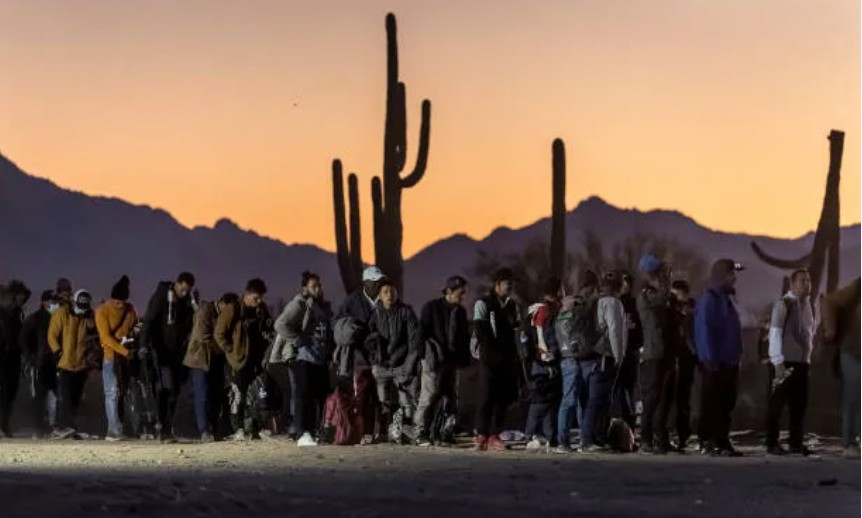The battlelines on immigration have hardened predictably. Left-leaning voters proudly display “refugees welcome” yard signs, while Donald Trump supporters cheer his pledge to implement “largest deportation operation in the history of our country”. Amid such partisan attitudes, it has become heretical to suggest that the Democrats need to be tougher on immigration.
But they must. In the long run, progressives have no choice but to acknowledge that huge infusions of migrants stress welfare systems and depress wages for low-skill workers while damaging social cohesion. Only by accepting this, and making the case for border security and less tolerance for migrant rule-breaking, can the Left reconnect with its blue-collar roots.
And perhaps it isn’t such a heretical thought. Across the world, Left-leaning political parties have fared best when they have adopted restrictive policies on migration. The reigning Social Democratic Party of Denmark has won successive elections over the last decade with no fear from the populist Right, in large part because of its refusal to take in new asylum seekers and in its efforts to reduce any net migration.
For centre-left Danes, this position isn’t so much an aberration, but an extension of the fight against neoliberalism. “For me, it is becoming increasingly clear that the price of unregulated globalisation, mass immigration and the free movement of labour is paid for by the lower classes,” Mette Frederiksen, the SDP leader and Danish Prime Minister wrote in her autobiography.
The same can be said of the United States. It is no coincidence that the era of lowest immigration to this country, between the Thirties and Sixties, coincided with the greatest expansion of labour unions, the New Deal, and the Great Society. Reduced migration meant less infighting and greater focus on the broad public interest among the working and middle class. It was these decades that gave us the federal minimum wage as well as Medicare and Social Security, our most durable and most generous entitlement programmes.
Contemporary trends also strongly correlate. Democrats this century have won the White House only in years of decreasing migration. In 2008 and 2012, the years Barack Obama won two successive bids, immigration was down sharply. Four years ago, the Covid pandemic led to the closure of the US-Mexico border and the suspension of most visa programmes, measures that led to the fastest decline in migration on record. Of course, these weren’t the only factors, but the absence of a migration crisis sucked the wind out of the sails of Trump’s reelection that year.
More recently, the Democrat Representatives Marie Gluesenkamp Perez and Jared Golden, who represent two of the three districts that the Democrats held onto in Trump country, bucked their party by voting for hardline immigration enforcement and never missed an opportunity to remind voters that they disagreed with their party leaders on this issue. That’s not to say they abandoned the Left. Golden is a torchbearer of labour unions and Perez has been outspoken on breaking up corporate monopolies. But they show how the Democrats can once again become a big tent party, bringing back independent voters.
Many progressives disagree, pointing to the racist quota systems behind 20th-century limitations on migration. And it’s true that the Johnson-Reed Act of 1924, which slashed migration by more than 80%, had bigoted justifications in line with the more intolerant views of the day. But racist beliefs of the past should not be weaponised to dishonestly argue against race-neutral immigration laws of the present. Migration levels can be cut across the board and a merit-based system need not have any ethnic component. Border security should not take race or ethnicity into account.
It is this dangerous conflation of laissez-faire migration policy and anti-racist activism that has wreaked havoc among the Left. In the reaction to the first Trump Administration, many liberals unthinkingly embraced unlimited migration as a progressive value. Such views only widened the distance between the Left and the working class.
The Left seems to have all but forgotten who is pushing, behind the scenes, for fewer immigration barriers. The fast food giants, industrial agribusiness interests, slaughterhouses, and other business groups lobby to import new workers on a strictly economic basis. Corporate executives leaned on the Biden Administration to increase the flow of migration over the last four years to reduce what they euphemistically called “wage inflation” — business-speak for higher wages won by tight labour markets. Silicon Valley, meanwhile, has championed its own immigration lobbying bonanza in a bid to bring lower wage computer programmers to American shores.
Most mainstream Democrats, including Joe Biden, once sang a different tune and recognised the connection between business and mass migration. Back in 2006, Biden previously campaigned on building a new border fence and enacting new laws to “punish American employers who knowingly violate the law when they hire illegals”.
But the shift away from their traditionally tough stance has coincided with the changing demographics of the party base, especially its core of urban, educated professionals — who tend to benefit economically from mass migration. If you’re an educated white-collar worker, it’s unlikely you will face direct economic competition with a migrant hailing from Venezuela or Afghanistan. In most cases, you benefit from the lower wages of immigrant Uber drivers, maids, and kitchen staff in the form of cheaper goods and services. And there’s a small chance that you will be competing with migrants for limited spots at a homeless shelter or in line at the food bank.
This shift was only accelerated by Trump’s arrival. In 2017, Left-leaning politicians reflexively began opposing anything Trump supported, even if these ideas were in line with traditional Democratic policy priorities. For instance, they began dismantling routine immigration enforcement mechanisms, such as the 287(g) local law enforcement program, put into place by previous Democratic presidents, tying the hands of the Biden administration.
In those years, activists and politicians alike embraced slogans like “Abolish ICE” and competed to show deference to illegal aliens. It was in the midst of this dynamic that Kamala Harris took her most unpopular stances, such as her pledge to provide undocumented aliens in detention centres with taxpayer-funded transgender surgeries.
More to the point, the highly educated activist Left created cultural parameters that made open discussion of these issues impossible. Recall the treatment of Bernie Sanders who went viral for retorting: “Open borders? That’s a Koch brothers idea.” Invoking the arch-Republican billionaires, Sanders was expressing concern that mass migration lowers wages to the benefit of corporate interests. But many liberal media outlets decried Sanders as a racist bigot, an “ugly” xenophobic dinosaur of the highest order. An idea that once formed the bedrock of the labour movement has been transformed into an example of Leftist heresy.
But take it from the Cato Institute, the gem of the Koch foundation-backed libertarian research centres. Alex Nowrasteh, the vice president of the institute, previously commented on the benefits of mass immigration from the perspective of the pro-business elite.
“A diverse population,” Nowrasteh observed wryly on a thread debating mass migration, “reduces social solidarity, which is good for economic growth because people don’t want wealth-destroying policies to help out people who look different.”
In other words, waves of immigrants are favoured by this Koch-backed pundit not only for macro-economic reasons. He sees the cultural and political disruption it fuels as an essential benefit. The less societal cohesion, the less likely welfare state policies will advance.
I view the issue from the opposite direction from the Koch foundation world. The need for new social programmes is already fast approaching. Americans are living longer than ever, exacerbating the financial outlook of retirees and care facilities. And the rapid growth of artificial intelligence and other automation technology may soon replace tens of millions of workers. But if society is so consumed with backlash over immigration, how will the Left ever propose a workable solution to any of these challenges?
Borders pose an existential challenge for Democrats, one that forces them to reckon with the drift on class. Will American remain perpetually in conflict over new arrivals, constantly divided and competing with lower wage workers and pondering questions of shifting cultural identity, or will we end this cycle and fix the problems that plague our most struggling citizens. The future of progressive policy depends on solving it.
Source: UnHerd













No comments.
By submitting a comment you grant Free West Media a perpetual license to reproduce your words and name/web site in attribution. Inappropriate and irrelevant comments will be removed at an admin’s discretion. Your email is used for verification purposes only, it will never be shared.